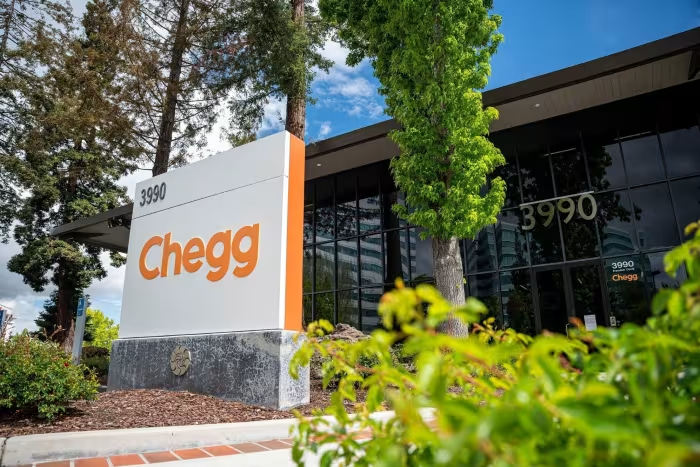
Chegg, once a giant in online education and homework help, has recently faced a seismic shift. The company, long trusted by students for its educational resources, is now struggling after facing competition from an unexpected challenger—ChatGPT.
For years, students turned to Chegg for help with assignments, often for a monthly fee of $19.95. During the pandemic, as virtual learning boomed, so did Chegg’s popularity and stock. But since ChatGPT launched, offering instant homework solutions for free, Chegg’s subscribers have steadily declined. Today, the company’s stock has plummeted nearly 99% from its 2021 peak, wiping out billions in market value. With half a million subscribers gone, Chegg’s once-thriving business model now faces doubts about its future.
While Chegg has started building its own AI-driven tools, its efforts to adapt haven’t yet succeeded in winning back the students and investors who’ve shifted to ChatGPT. Students now find ChatGPT a convenient alternative. “It’s free, it’s instant, and you don’t really have to worry if the problem is there or not,” said Jonah Tang, an M.B.A. student in San Diego, emphasizing ChatGPT’s ease of use.
Recent surveys reveal a stark reality: only 30% of college students now intend to use Chegg, down from 38% last spring, while a growing 62% prefer ChatGPT.
A Company in Crisis and Leadership Changes
With CEO Dan Rosensweig stepping down, Chegg’s veteran Nathan Schultz has taken the reins, initiating layoffs and focusing on expansion. Schultz aims to redefine Chegg as a resource beyond homework answers, targeting what he calls the “curious learner” by expanding services and improving answer quality.
Chegg’s troubles reflect a broader shift in education. A study from the University of Illinois revealed that ChatGPT has quickly become the go-to source for students seeking help with programming assignments—replacing services like Chegg as students turn to chatbots for instant solutions.
In response, Chegg has defended its platform, emphasizing its commitment to preventing misuse. However, its efforts to adapt have faced setbacks. Initially launched as a promising collaboration with OpenAI, “Cheggmate” was intended to provide AI-generated answers but was ultimately shelved. Chegg is now developing a new set of AI tools in collaboration with Scale AI, aiming to tailor solutions for various academic disciplines.
Rebranding and Innovation with AI
In a bid to stay relevant, Chegg has revamped its site to resemble ChatGPT’s user experience, inviting students to request help directly. Automated answers now allow Chegg to cut costs by approximately 75% compared to human responses, but this shift has not yet curbed subscription losses. Revenue for Chegg continues to decline, with analysts forecasting a significant drop in upcoming quarters.
Some students remain dissatisfied with the AI-based responses. Ahmed Assalmi, a student at Taif University, recently subscribed to Chegg but felt underwhelmed by the AI-driven answer he received. He found ChatGPT’s response more accurate, even though Chegg states that 91% of users are satisfied with its service.
According to Schultz, Chegg is now in “execution mode,” working on a roadmap that integrates AI in ways that cater to students with needs that go beyond readily available answers.
Chegg’s journey to adapt to an AI-driven world highlights the challenges faced by companies rooted in traditional models. With competition from free and instant solutions like ChatGPT, Chegg’s path forward depends on its ability to innovate and meet evolving educational needs. For now, the company is betting on a vision where it remains valuable to students in a rapidly changing academic landscape.

Leave a Reply